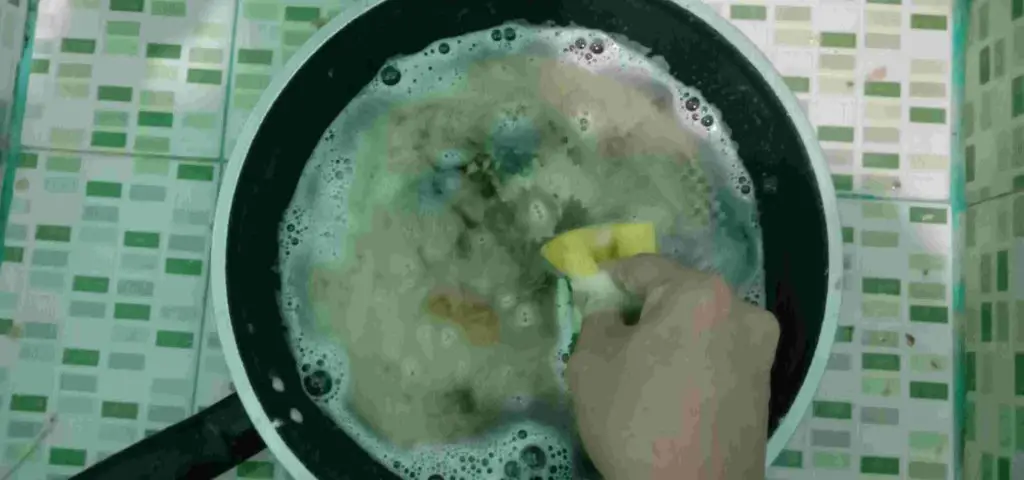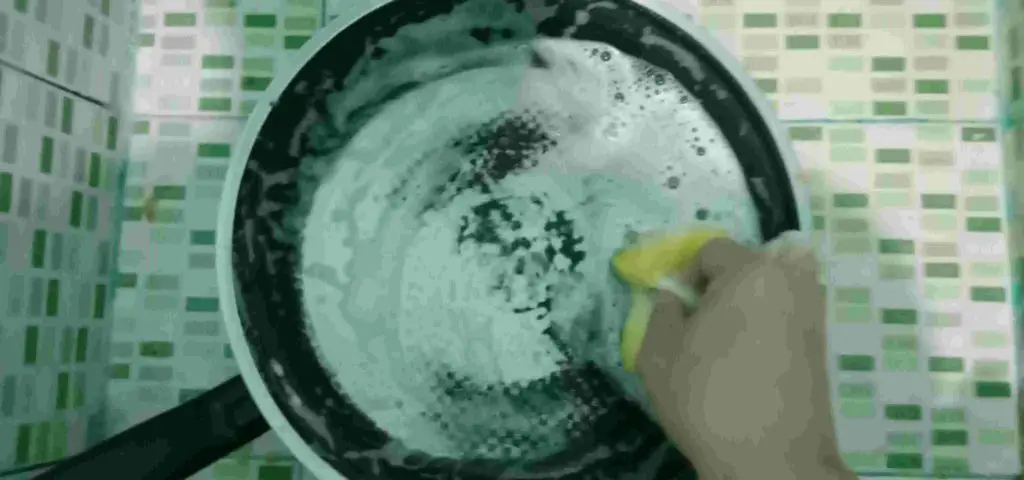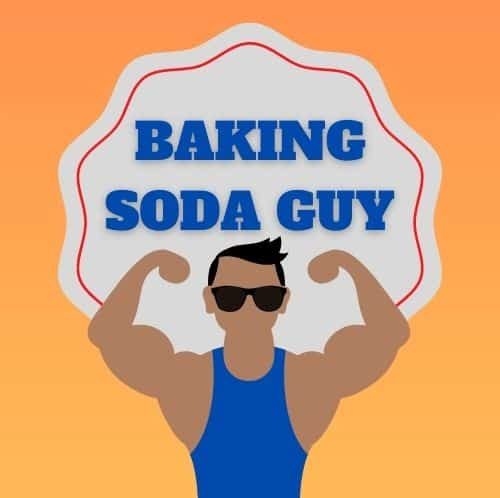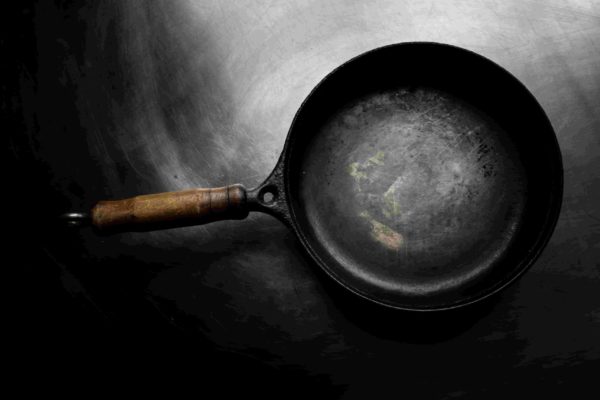If you have been cooking for a while, at some point, you dreaded the clean-up after. Especially removing burnt food from pans.
It can be a total nightmare but, with some good ol’ baking soda, it doesn’t have to be.
In this article, I’ll show you how I use dishwashing soap and baking soda to remove burned food bits from my pan.
What You’ll Need:
4-6 Tablespoons Baking Soda
Dishwashing Soap
Scrub sponge
Water
Steps:
1. Fill the pan about a quarter of the way with warm water.

2. Pour in 2-5 tablespoons of baking soda and a few drops of dishwashing soap. Stir it a little bit to dilute the dishwashing soap.

3. Let it sit for at least 20-30 minutes, depending on the hardness and thickness of the burnt bits of food. Sometimes I even leave it overnight for really stubborn stains.
4. Use the sponge to scrape the burnt food. By this time, it will be much easier to remove. Start gently to avoid scratching the surface of your pan. Use a circular motion focusing on the hard bits.

5. When you’re done scrubbing off the food bits, wash the pan with dishwashing soap and water. Make sure you wash off all the soap. If it still feels slippery, keep rinsing with water.

6. Dry your pan with a towel. Store in a clean and dry place.
For a Seriously Burned Pan, Use White Vinegar
If leaving the baking soda and soap solution on the pan overnight wasn’t enough to soften the burned food, use vinegar. Try these steps:
- Pour equal parts of water and vinegar to fill about 1/4 of the height of your pan. Make sure that it covers the entire bottom of the pan.
- Let it boil, then simmer for 10 to 15 minutes. That should soften the burnt food.
- Remove the pan from the stove.
- Drain the pan.
- After that, add two tablespoons of baking soda directly to the burnt bits and start scrubbing. The low-abrasive nature of baking soda should help in scraping the food bits off.
- Rinse clean and dry.
I remember doing this to remove burnt fried rice from my pan. It worked like a charm.
Check The Manufacturer’s Guide of Your Pan
Always read the manufacturer’s guide before using DIY (do-it-yourself) methods to clean your pan. Baking soda is only mildly abrasive, but it’s better to be sure.
The non-stick coating of my pan got ruined because I used a rough scrubbing brush. I should’ve just soaked it in baking soda and dishwashing soap instead. Let this be a warning.
Why is Baking Soda Effective in Cleaning Burnt Pans?
Baking soda is an effective cleaning agent for burnt pans because of its alkaline nature. When mixed with water, it produces sodium ions that create an alkaline solution, which can help to break down and soften the burnt food particles.
The low-abrasive nature of baking soda also makes it safe to use on most cookware without scratching or damaging the surface.
The Benefits of Using Natural Cleaning Agents Like Baking Soda
Using natural cleaning agents like baking soda and dishwashing soap can have several benefits over harsh chemical cleaners. Firstly, they are more eco-friendly and less harmful to the environment.
Secondly, they are less toxic to humans and pets, making them a safer option to use in homes.
Finally, using natural cleaning agents can be more cost-effective than purchasing expensive chemical cleaners.
Tips for Preventing Burnt Food in Pans
To prevent burnt food in pans, it’s important to pay attention to the cooking process. This can involve using a lower heat setting while cooking, stirring the food more frequently, and using a non-stick pan.
Additionally, using a timer to keep track of cooking time can help to prevent food from becoming overcooked and burnt.
When to Replace Your Burnt Pan
If a pan has been burnt or has lost its non-stick coating, it may be time to replace it. Signs of damage to look for include scratches, cracks, and areas where the non-stick coating has worn away.
If in doubt, it’s always best to consult with a professional cookware expert who can advise on the best course of action.
Can I Use Vinegar to Clean a Burnt Pan?
Yes, vinegar can be an effective cleaning agent for burnt pans. Simply fill the pan with equal parts water and vinegar, let it boil, and then let it simmer for 10 to 15 minutes just like the method above. After draining the pan, add baking soda to the burnt bits and scrub them off with a sponge.
It’s best to avoid using vinegar on aluminum, copper, and cast iron pans because it can damage their surfaces or remove their seasoning. Check the manufacturer’s guidelines for specific recommendations on cleaning and maintenance.
How Often Should I Clean My Pans?
It’s a good idea to clean your pans after each use to prevent the buildup of food residue and grease. However, burnt pans may require a more thorough cleaning using baking soda and dishwashing soap.
What if the Burnt Food is Stuck to the Pan and Won’t Come Off Even with Baking Soda?
For really stubborn stains, you may need to use a specialized cleaning product or consult with a professional cookware expert for advice on how to remove the burnt food without damaging the pan.
Conclusion:
And that’s how I use baking soda to clean a burnt pan. It’s easy and works well for me.
Now I just need to learn how to be a better cook to avoid burning food again.
By the way, if you’re looking for other ways to use baking soda in the kitchen, here’s an article on how to clean your fridge.
Share this article with your friends if it helps you.
Thank you for reading.
-Baking Soda Guy
FAQ’s:
Q: Can I use vinegar to clean a burnt pan?
A: Yes, vinegar can be an effective cleaning agent for burnt pans. Follow the steps outlined in the article to use vinegar along with water to soften the burnt food and then scrub it off using baking soda and a sponge. Be cautious with certain types of pans like aluminum, copper, and cast iron, as vinegar can potentially damage their surfaces.
Q: How often should I clean my pans?
A: It’s recommended to clean your pans after each use to prevent the buildup of food residue and grease. However, for burnt pans, a more thorough cleaning with baking soda and dishwashing soap might be necessary.
Q: What if the burnt food is stuck to the pan and won’t come off even with baking soda?
A: In cases of extremely stubborn burnt food stains, consider using a specialized cleaning product or seeking advice from a professional cookware expert. They can provide guidance on how to remove the burnt food without causing damage to the pan.
Q: When should I replace a burnt pan? A: If a pan has been burnt or lost its non-stick coating, signs of damage such as scratches, cracks, or areas where the coating has worn away indicate it may be time to replace the pan. Consulting a professional cookware expert is advisable when in doubt.
Q: What are the benefits of using natural cleaning agents like baking soda?
A: Natural cleaning agents like baking soda and dishwashing soap offer several benefits over harsh chemical cleaners. They are more eco-friendly, less harmful to the environment, less toxic to humans and pets, and can be more cost-effective.
Q: How can I prevent burnt food in pans?
A: To prevent burnt food, use a lower heat setting while cooking, stir the food more frequently, and consider using a non-stick pan. Employing a timer to track cooking time can also prevent food from becoming overcooked and burnt.
Q: Can I use the baking soda and dishwashing soap method on all pans?
A: While baking soda is mildly abrasive, it’s a good practice to check the manufacturer’s guide before using any DIY cleaning method on your pan. Some pans might have specific care instructions to ensure their longevity.
Q: What should I do if I damage the non-stick coating of my pan?
A: If the non-stick coating of your pan gets damaged, consult the manufacturer’s guide for recommendations. Using baking soda and dishwashing soap might be a gentler alternative to abrasive scrubbing brushes.
References:
https://homecookworld.com/how-to-avoid-burning-the-pan/
https://www.livescience.com/why-baking-soda-vinegar-clean.html
Top Photo by Helinton Fantin on Unsplash


